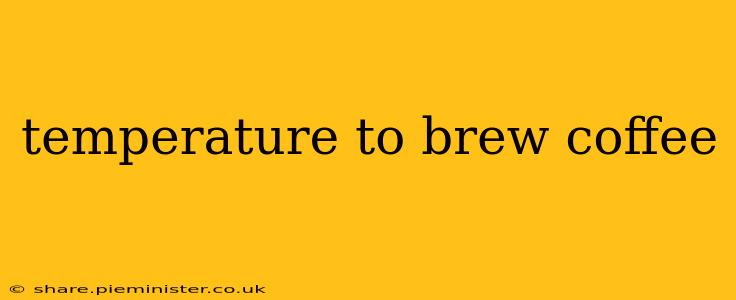Brewing coffee at the optimal temperature is crucial for unlocking its full flavor potential. Too hot, and you risk bitterness and burnt notes. Too cold, and you'll end up with a weak, sour brew. This guide will explore the ideal temperature range and address common questions about how water temperature impacts your coffee experience.
What is the ideal water temperature for brewing coffee?
The generally accepted ideal water temperature for brewing coffee is between 195°F (90°C) and 205°F (96°C). This range allows for optimal extraction of the coffee grounds' flavorful compounds without over-extracting the bitter compounds. Slight variations within this range can affect the final taste profile, so experimenting to find your personal preference is encouraged.
What happens if the water is too hot when brewing coffee?
Using water that's too hot (above 205°F or 96°C) can lead to several negative consequences:
- Increased Bitterness: Over-extraction occurs, releasing excessive bitter compounds from the coffee grounds. This results in a harsh, unpleasant taste.
- Burnt Taste: Extremely high temperatures can scorch the coffee grounds, leading to a burnt or acrid flavor.
- Reduced Acidity: High heat can also negatively impact the delicate acidity that contributes to a balanced and bright cup.
What happens if the water is too cold when brewing coffee?
Brewing with water that's too cold (below 195°F or 90°C) results in under-extraction. This means that not all the flavorful compounds are dissolved, leading to:
- Sourness: Under-extracted coffee often tastes sour and acidic due to the incomplete extraction of desirable compounds.
- Weakness: The resulting brew will lack body and intensity, tasting weak and watery.
- Muddy Taste: In some cases, under-extraction can lead to a muddy or unbalanced flavor profile.
How can I accurately measure the water temperature for brewing coffee?
Accuracy is key when it comes to brewing coffee. Here are a few ways to ensure you're using the correct water temperature:
- Gooseneck Kettle: These kettles allow for precise pouring and temperature control, making them ideal for pour-over methods. Many models include built-in thermometers.
- Thermometer: A simple immersion thermometer is a cost-effective way to accurately measure the water temperature in any kettle.
- Electric Kettle with Temperature Control: Many electric kettles offer precise temperature settings, allowing you to select the exact degree you need.
Does the type of coffee affect the ideal brewing temperature?
While the 195-205°F (90-96°C) range is a good starting point for most coffees, some variations may be necessary depending on the coffee bean's origin, roast level, and grind size. Generally, darker roasts might benefit from slightly lower temperatures to avoid excessive bitterness, while lighter roasts might tolerate higher temperatures to fully extract their nuanced flavors. Experimentation is key to finding the perfect temperature for your specific coffee.
How does brewing method affect the ideal water temperature?
Different brewing methods might slightly adjust the ideal water temperature range. For example, espresso typically requires a higher water temperature (around 200°F or 93°C), while cold brew utilizes much lower temperatures (around 70°F or 21°C) for a longer extraction time. Always consult the specific brewing instructions for your chosen method.
By understanding the impact of water temperature on your coffee brewing process, you can consistently produce a delicious cup every time. Remember to experiment and adjust to find the perfect temperature that best suits your taste and preferred brewing method.
